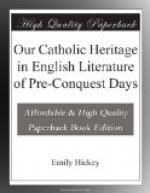This was Brythnoth’s answer:
Dost hear, thou dweller on
the sea, what this my people saith!
Their tribute is the spear,
the sword, the arrow tipt with death;
War-harness that for you in
fight full little profiteth.
Not he. He stood for his own soil, his prince’s earth, the people and the land. We may compare with this St AElfeah’s (Alphege) splendid stand even to death against unjust payment of tribute.
Byrthtnoth ordered his men to march on till they all stood on the bank of the river. The flood flowed in after the ebb, and the hostile armies could not reach each other, and it seemed too long to wait for the water to let them meet. Wulfstan, by race a warrior bold, held the bridge for his chief, and AElfhere and Maccus with him, the undaunted mighty twain. The Danes begged to be allowed to overpass the ford, and Byrhtnoth in his scorn allowed this.
Too much the earl in his disdain
to that ill folk gave heed.
The wolves of slaughter strode
along, nor for the water cared;
The host of vikings westward
there across the Pante fared.
Byrhtnoth was awaiting them, and the fight began.
Then rose a cry as round and
round the ravens wheeled in air,
The erne all greedy for his
prey. A mighty din was there.
Oh, bitter was the battle-rush,
the rush of war that day,
Then fell the men; on either
hand the gallant young men lay.
The battle-rage grew stronger and keener; the din of war grew louder and louder. Byrhtnoth fought hand to hand with a strong viking, and with yet another, dealing death to both.
The blither was the earl for
that, out laughed the warrior grim,
Thanked God because of that
day’s work which God had given to him.
But the brave man’s time was come, and a dart pierced him, and he fell; and as he lay on the ground a young lad, a boy who stood beside him, drew the spear from his lord’s body and cast it back to pierce the foe who had sorely hit his lord. An armed man came to the death-stricken leader of the English to rob him of his jewels and his warrior’s gear and fretted sword of fame. The dying man struck him on the corslet, but
Too soon a seaman hindered him; that good arm’s strength he marred.
The leader drops his gold hilted sword, no longer able to wield the weapon, powerless to hold the keen-edged falchion. No more deeds of valour for him; only to urge on his men, and to commend his soul to God.
Yet spake the word that warrior
hoar, the young men’s hearts he cheered,
Bad the good comrades forward
go, nor ever be afeard.
No longer could he firmly
stand on’s feet; to heaven looked he—
“Thanks, Lord of hosts,
for these world-joys Thou here didst give to me.
Now, merciful Creator, now,
I stand in deepest need
That Thou shouldst grant my
spirit good, that thus my soul indeed
Fare forth to Thee, travel
with peace, O King of Angels, so:
I pray Thee that the hell-spoilers
nor work her hurt nor woe.”
The heathen varlets smote
him down, and those that stood him by,
AElfnoth and Wulfmaer, by
the side of him in death did lie.




